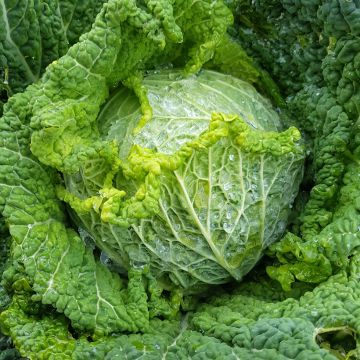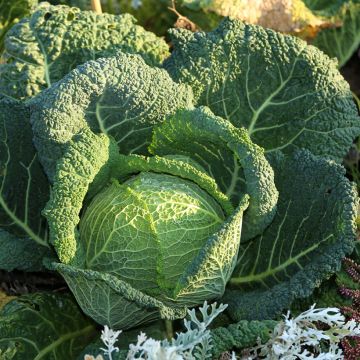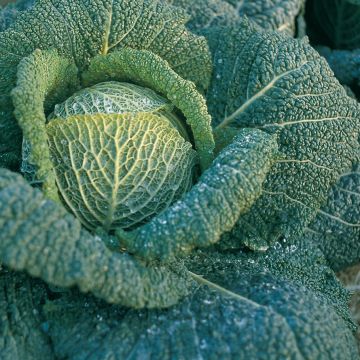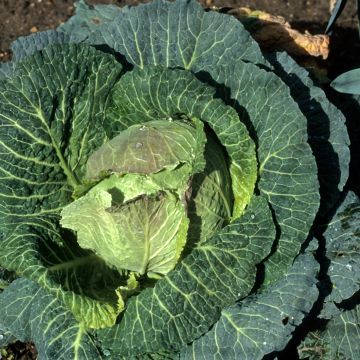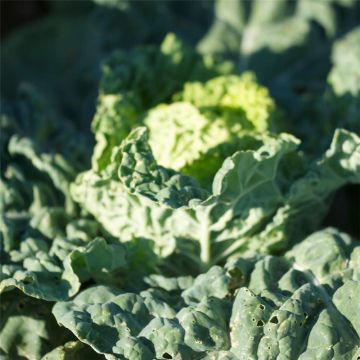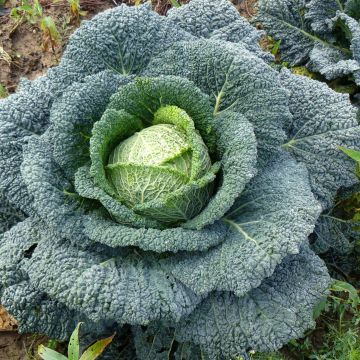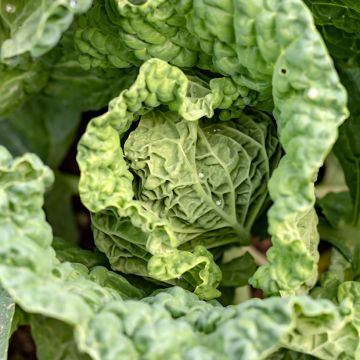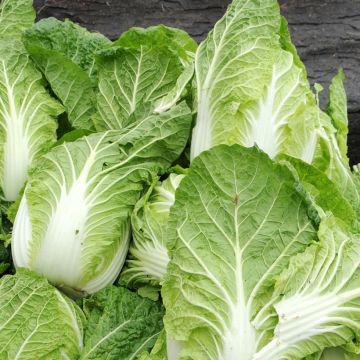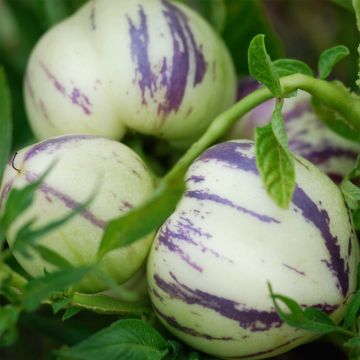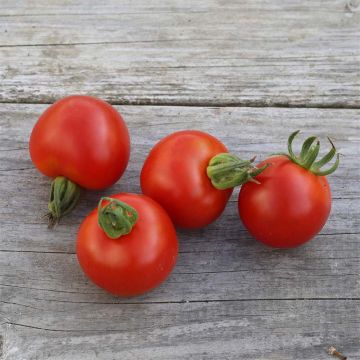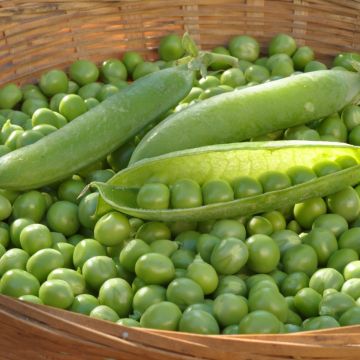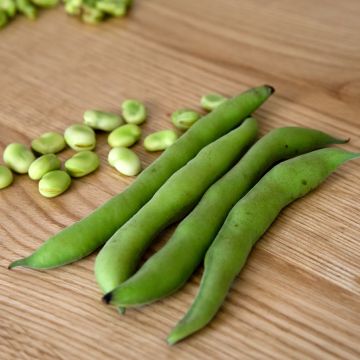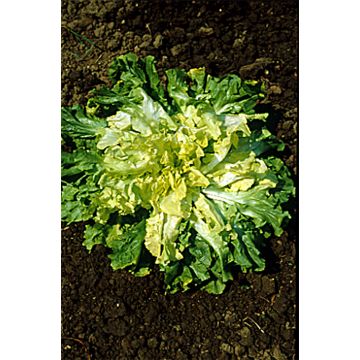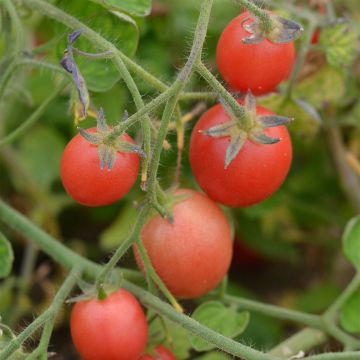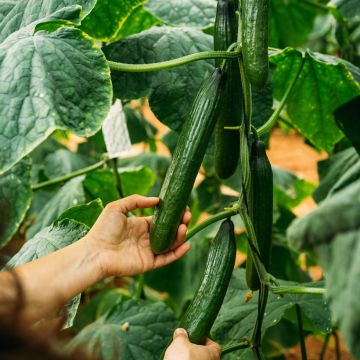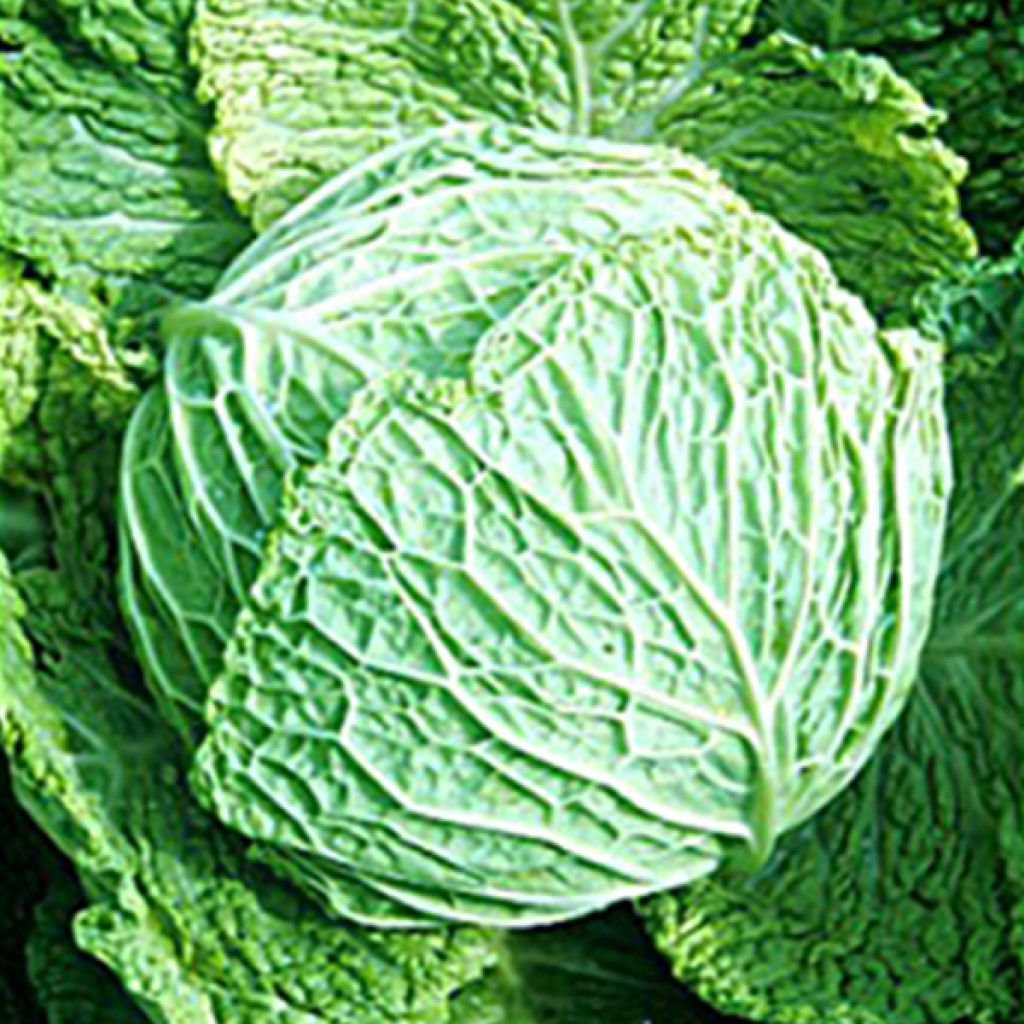

Cabbage Gros des Vertus - Brassica oleracea sabauda
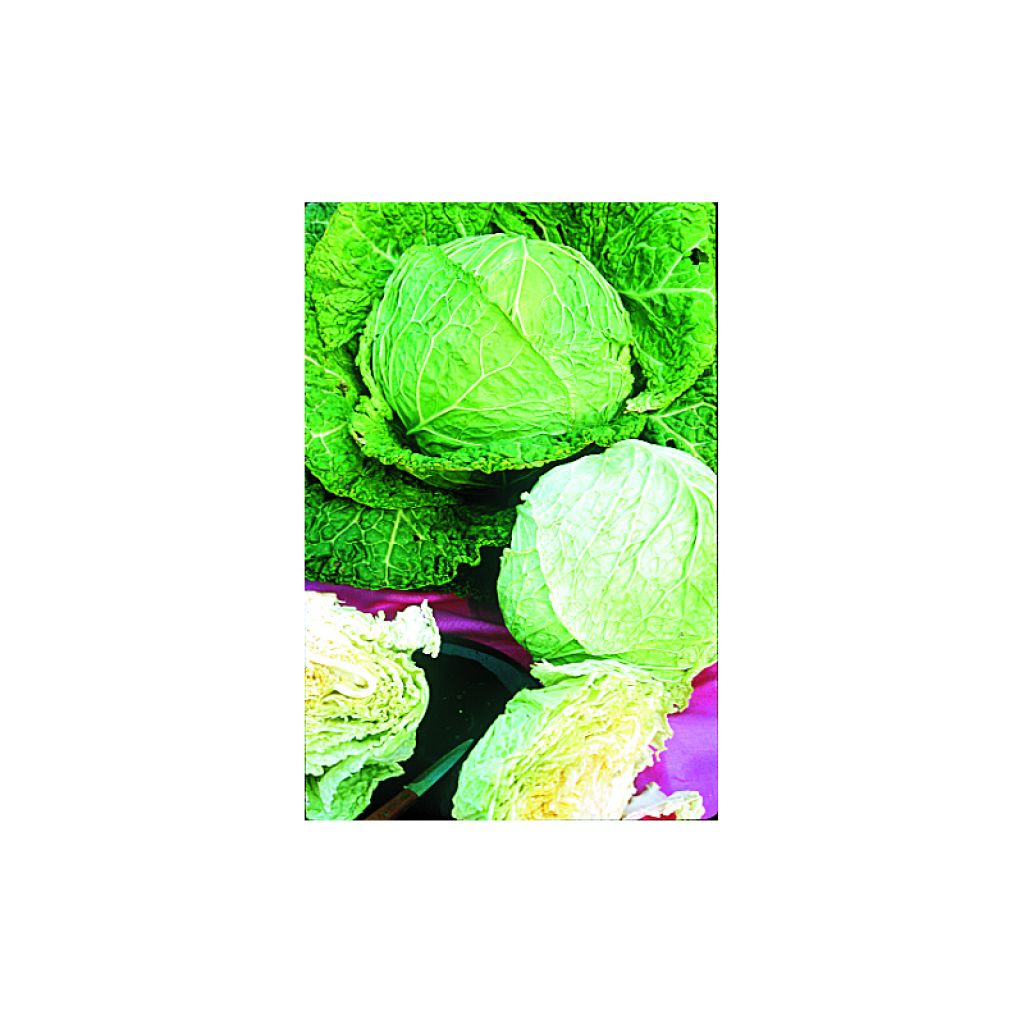

Cabbage Gros des Vertus - Brassica oleracea sabauda
Cabbage Gros des Vertus - Brassica oleracea sabauda
Brassica oleracea sabauda Gros des Vertus
Wild Cabbage, Cabbage
Product that perfectly matches the description, carefully packaged and delivered on time!
Catherine K., 05/02/2018
This item cannot be shipped to the selected country
Dispatch by letter from €3.90
Delivery to Corse prohibited
More information
Schedule delivery date,
and select date in basket
This plant carries a 6 months recovery warranty
More information
We guarantee the quality of our plants for a full growing cycle, and will replace at our expense any plant that fails to recover under normal climatic and planting conditions.
Seed-only orders are dispatched by sealed envelope. The delivery charge for seed-only orders is €3.90.
Delivery to Corse prohibited: UE law prohibits the import of this plant from mainland France to Corse as part of the fight against Xylella fastidiosa. Please accept our sincere apologies.
More information

Description
The Giant of Virtues Milan Cabbage is a late variety, very hardy, that produces large, slightly flattened heads composed of blistered leaves. This cabbage can withstand early frost and stores very well, making it ideal for autumn harvests. Sow from March to June for a harvest from August to December.
Also known as Savoy Cabbage, Blistered Cabbage, Curly Cabbage, or Curly-headed Cabbage, the Milan Cabbage has the Latin name Brassica oleracea sabauda (sabauda referring to Savoy in Latin). It belongs to the large family of Brassicaceae (formerly Cruciferae).
Originating, unsurprisingly, from Italy and more specifically from Milan, this cabbage is quite similar to the Cabbage but differs in the blistered or curly appearance of its leaves. There are many varieties, with production ranging from spring to winter. By carefully selecting your seeds and spreading out the sowings over time, you can have this vegetable for a very long period.
An autumn and winter vegetable par excellence, Milan Cabbage is resistant to cold. It is delicious raw in salads but can also be cooked, braised with sausages or even with fish. From a nutritional point of view, this leaf vegetable is remarkable: it is low in calories and very rich in vitamins C and B6, and also contains a lot of fiber and minerals like calcium.
In the garden, like almost all cabbages (Brussels Sprouts being the exception), Milan Cabbage is a demanding vegetable, requiring excellent base fertilization and regular moisture.
Harvest: It is harvested when the head is full by simply cutting it at ground level.
Storage: Pommel Cabbages can be stored for quite a long time in the field and can be kept in the refrigerator for several days. They also freeze very well after being blanched for 3 to 5 minutes in salted boiling water.
Gardener's tip: The main enemy of cabbage is the Cabbage White Butterfly (Pieris brassicae), a pretty creamy-white butterfly with small black spots that awakens from April-May to wreak havoc all summer by devouring its leaves. Don't let yourself be caught off guard and opt for prevention by installing an insect-proof netting tightly on market garden hoops. These nets are easy to set up and reusable to protect, for example, your carrot and leek crops.
Report an error about the product description
Harvest
Plant habit
Foliage
Botanical data
Brassica
oleracea
sabauda Gros des Vertus
Brassicaceae
Wild Cabbage, Cabbage
Cultivar or hybrid
Annual
Other Milan cabbage seeds
Planting and care
Sowing:
The germination temperature of the Savoy Cabbage Gros des Vertus is around 15° and takes about 14 days.
It is sown from March to June for a harvest from August to December.
You can proceed with direct sowing in place or prepare seedlings that will then be installed in the garden in their final position.
Seedling preparation: Under heated shelter, from late autumn to late winter or under cold greenhouse or in nursery in the garden for the rest of the year, sow the seeds at a depth of 1 cm (0in) in a good seed compost. Cover lightly with compost or vermiculite. Don't forget to keep the substrate moist but not waterlogged!
When the young plants appear strong enough to be handled, transplant them into pots if necessary and, for seedlings under heated shelter, gradually acclimatize them to cooler temperatures before transplanting them to the garden, when there is no longer any risk of frost.
Direct sowing: In properly amended and finely worked soil, make furrows 1 cm (0in) deep, spaced 40/50 cm (16/20in) apart. Sow the seeds and cover them with a thin layer of fine soil, when the seedlings are well developed, thin them out, leaving one plant every 60 cm (24in) or so.
Cultivation:
Savoy Cabbage is grown in the sun. It is a demanding vegetable, requiring well-rotted, nitrogen-rich and potassium-rich soil. It is advisable, preferably in autumn, to generously apply mature compost (about 3/4 kg per m2), by digging it in to a depth of 5 cm (2in), after having, as with any vegetable crop, thoroughly loosened the soil. It is not very tolerant of soil pH, which should be between 5.6 and 6.5. In acidic soil, it will be necessary to gradually raise this pH by adding calcium in the form of Dolomite or Lime.
It is beneficially associated with many vegetables such as tomatoes, lettuce... But avoid planting it next to other Brassicas as well as zucchini, fennel, lamb's lettuce, leek and strawberry.
Seedlings
Care
Intended location
-
, onOrder confirmed
Reply from on Promesse de fleurs
Vegetable seeds
Haven't found what you were looking for?
Hardiness is the lowest winter temperature a plant can endure without suffering serious damage or even dying. However, hardiness is affected by location (a sheltered area, such as a patio), protection (winter cover) and soil type (hardiness is improved by well-drained soil).

Photo Sharing Terms & Conditions
In order to encourage gardeners to interact and share their experiences, Promesse de fleurs offers various media enabling content to be uploaded onto its Site - in particular via the ‘Photo sharing’ module.
The User agrees to refrain from:
- Posting any content that is illegal, prejudicial, insulting, racist, inciteful to hatred, revisionist, contrary to public decency, that infringes on privacy or on the privacy rights of third parties, in particular the publicity rights of persons and goods, intellectual property rights, or the right to privacy.
- Submitting content on behalf of a third party;
- Impersonate the identity of a third party and/or publish any personal information about a third party;
In general, the User undertakes to refrain from any unethical behaviour.
All Content (in particular text, comments, files, images, photos, videos, creative works, etc.), which may be subject to property or intellectual property rights, image or other private rights, shall remain the property of the User, subject to the limited rights granted by the terms of the licence granted by Promesse de fleurs as stated below. Users are at liberty to publish or not to publish such Content on the Site, notably via the ‘Photo Sharing’ facility, and accept that this Content shall be made public and freely accessible, notably on the Internet.
Users further acknowledge, undertake to have ,and guarantee that they hold all necessary rights and permissions to publish such material on the Site, in particular with regard to the legislation in force pertaining to any privacy, property, intellectual property, image, or contractual rights, or rights of any other nature. By publishing such Content on the Site, Users acknowledge accepting full liability as publishers of the Content within the meaning of the law, and grant Promesse de fleurs, free of charge, an inclusive, worldwide licence for the said Content for the entire duration of its publication, including all reproduction, representation, up/downloading, displaying, performing, transmission, and storage rights.
Users also grant permission for their name to be linked to the Content and accept that this link may not always be made available.
By engaging in posting material, Users consent to their Content becoming automatically accessible on the Internet, in particular on other sites and/or blogs and/or web pages of the Promesse de fleurs site, including in particular social pages and the Promesse de fleurs catalogue.
Users may secure the removal of entrusted content free of charge by issuing a simple request via our contact form.
The flowering period indicated on our website applies to countries and regions located in USDA zone 8 (France, the United Kingdom, Ireland, the Netherlands, etc.)
It will vary according to where you live:
- In zones 9 to 10 (Italy, Spain, Greece, etc.), flowering will occur about 2 to 4 weeks earlier.
- In zones 6 to 7 (Germany, Poland, Slovenia, and lower mountainous regions), flowering will be delayed by 2 to 3 weeks.
- In zone 5 (Central Europe, Scandinavia), blooming will be delayed by 3 to 5 weeks.
In temperate climates, pruning of spring-flowering shrubs (forsythia, spireas, etc.) should be done just after flowering.
Pruning of summer-flowering shrubs (Indian Lilac, Perovskia, etc.) can be done in winter or spring.
In cold regions as well as with frost-sensitive plants, avoid pruning too early when severe frosts may still occur.
The planting period indicated on our website applies to countries and regions located in USDA zone 8 (France, United Kingdom, Ireland, Netherlands).
It will vary according to where you live:
- In Mediterranean zones (Marseille, Madrid, Milan, etc.), autumn and winter are the best planting periods.
- In continental zones (Strasbourg, Munich, Vienna, etc.), delay planting by 2 to 3 weeks in spring and bring it forward by 2 to 4 weeks in autumn.
- In mountainous regions (the Alps, Pyrenees, Carpathians, etc.), it is best to plant in late spring (May-June) or late summer (August-September).
The harvesting period indicated on our website applies to countries and regions in USDA zone 8 (France, England, Ireland, the Netherlands).
In colder areas (Scandinavia, Poland, Austria...) fruit and vegetable harvests are likely to be delayed by 3-4 weeks.
In warmer areas (Italy, Spain, Greece, etc.), harvesting will probably take place earlier, depending on weather conditions.
The sowing periods indicated on our website apply to countries and regions within USDA Zone 8 (France, UK, Ireland, Netherlands).
In colder areas (Scandinavia, Poland, Austria...), delay any outdoor sowing by 3-4 weeks, or sow under glass.
In warmer climes (Italy, Spain, Greece, etc.), bring outdoor sowing forward by a few weeks.

































